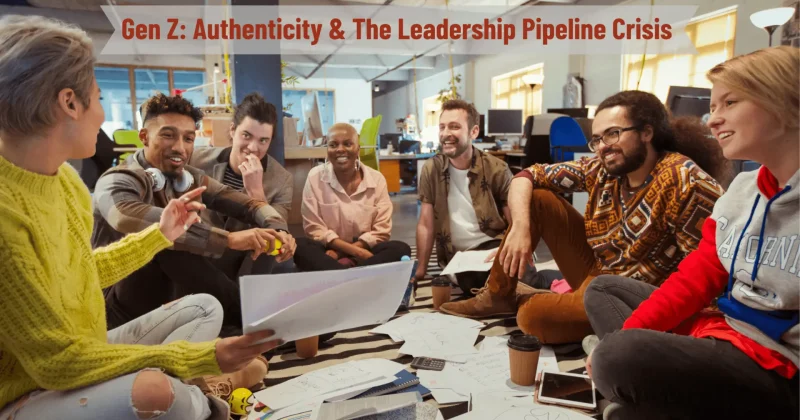Generation Z: Authenticity & The Leadership Pipeline Crisis
Written By Gavin Bryce

As Generation Z surges toward prominence in the workplace, expected to make up 27% of the global workforce by 2025, organisations face a stark new challenge: a shrinking leadership pipeline. With 78% of Gen Z employees planning to leave their jobs within a year and only 6% aspiring to traditional leadership roles, the rules of leadership are being rewritten. Senior leaders must adapt, or risk becoming irrelevant.
Summary
This article explores why Gen Z’s demand for authenticity, purpose-driven work, and psychological safety is putting pressure on traditional leadership models. You’ll discover how flattening hierarchies, distributing leadership, and demonstrating transparent values can help bridge the generational divide, and how coaching can catalyse that transformation.
Introduction
Generation Z’s entry into the workforce isn’t just a demographic shift, it’s a leadership earthquake. With high turnover intentions and low appetite for traditional management paths, younger professionals are signalling that old-school leadership models won’t cut it. It’s time to rethink how leadership develops and thrives in today’s world.
Authenticity and Purpose: The New Leadership Currency
Gen Z is drawn to leaders who embody personal values, provide real-time feedback, and work toward greater societal impact, not just profit. They’re less impressed with hierarchy and more inspired by leaders who “make an impact, not just manage people.” Transparent communication, mental health support, and visible alignment with social justice aren’t just perks, they’re non-negotiables for meaningful leadership engagement.
Coaching insight: Help senior leaders explore and articulate their values, model vulnerability, and anchor decisions to a broader mission. Encourage regular feedback loops and more informal communication channels across teams.
Flattened Structures and Distributed Leadership
Young professionals thrive in environments where leadership isn’t confined to a title. By reducing management layers, establishing cross-functional teams, implementing reverse mentoring schemes, and creating roles based on impact rather than tenure, organisations empower Gen Z with autonomy and trust. This shift not only boosts engagement but delivers fresh leadership energy.
Coaching insight: Guide leaders to sponsor projects led by multi-generational teams. Invite Gen Z voices into strategic conversations. Experiment with structures that de-emphasise hierarchy and celebrate influence. Coaching can help navigate unlearning old power paradigms to embrace collaborative leadership.
Prioritising Mental Health and Psychological Safety
Gen Z places enormous value on psychological safety and well‑being. With high reported burnout levels among current leaders and mental health issues costing the global economy trillions each year, organisations that fail to invest in emotional resilience lose both talent and productivity. Leaders who frequently inquire about well‑being are three times more likely to drive engagement, and half as likely to lose staff.
Coaching insight: Support leaders in modelling healthy boundaries, encouraging open dialogue about mental health, and establishing team norms that promote safe expression. Introduce frameworks like team agreements, mental‑health check-ins, and flexible work policies that embed safety into leadership practice.
Bridging a Strategic Generational Divide
With Gen Z and Gen Alpha entering a lean talent market, organisations can no longer afford to lose future leaders. Many of these younger professionals prefer entrepreneurship or specialist roles (“conscious unbossing”), bypassing traditional management tracks. Imposter syndrome and fear of cultural misalignment further deter leadership aspiration. Bridging this gap requires intentional, inclusive succession planning and diverse leadership pathways.
Coaching insight: Encourage initiatives such as reverse mentoring, cross-generational strategy groups, and leadership development tracks that honour diverse values and career goals. Offer experiential opportunities and incremental responsibilities to build confidence while reverse‑mentoring helps older leaders adapt and learn from younger mindsets.
Conclusion and Key Takeaways
Gen Z’s leadership expectations aren’t a fad, they’re a strategic imperative. Without embracing purpose-led, transparent, and psychologically safe leadership, organisations face higher turnover, disengagement, and a hollow leadership pipeline. The solution? Authentic, distributed leadership grounded in empathy and inclusive mindset change.
Key Takeaways
Authenticity matters: Leaders must model values, reinforce purpose, and open two-way communication.
Distribute leadership: Flatten structures, empower cross-functional teams, and embrace reverse mentoring.
Embed psychological safety: Normalise conversations about well-being and model healthy leadership behaviours.
Bridge generational gaps: Provide flexible leadership pathways, diversify succession planning, and build cross-generational trust.
Authentic leadership isn’t only vital for Gen Z, it strengthens engagement, innovation, and resilience across every generation in the workplace.